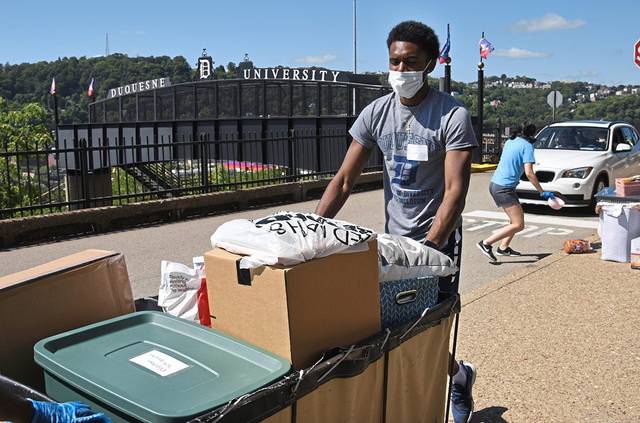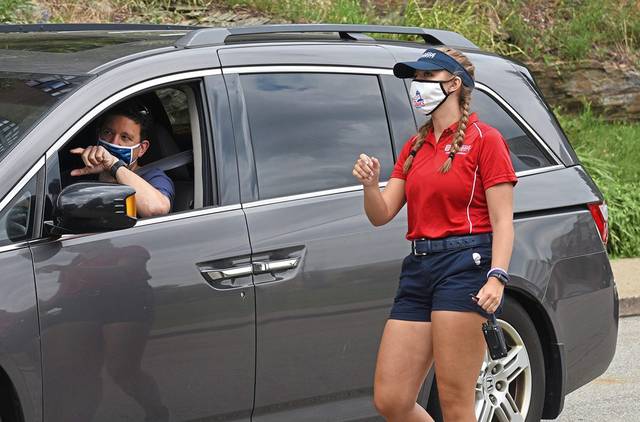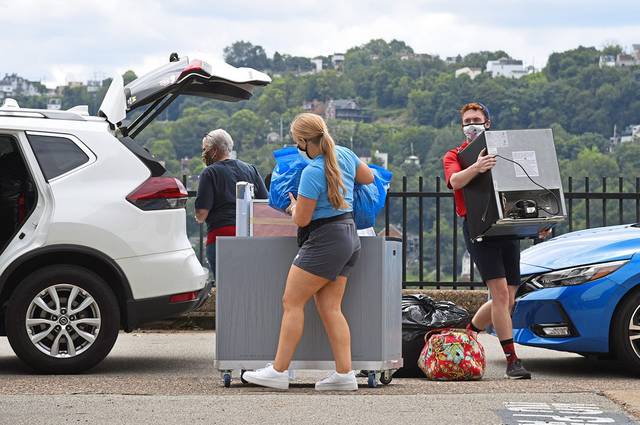Duquesne University hosted its freshman move-in over three days early this week. Normally a one-day affair, the university instead assigned time slots to the approximately 1,200 freshmen and transfer students to prevent crowding in the hallways.
“Given the current situation, we just didn’t feel that was safe,” said Adam Wasilko, assistant vice president of Student Involvement. “Our families have received it really well.”
Duquesne joins the ranks with other universities reopening campuses during the covid-19 pandemic, and during a turbulent week for higher education. Many universities have already begun reporting positive cases within their communities despite extensive measures to prevent covid-19 — University of North Carolina at Chapel Hill, for instance, abruptly shifted to a full online learning model after identifying at least four “clusters” of covid-19 on campus.
Experts worry the university’s doomed attempt at reopening could be repeated at institutions across the country.
Nearby, the University of Pittsburgh announced that in-person classes wouldn’t begin until at least Sept. 14, and Carnegie Mellon University said undergraduates would take classes remotely until Sept. 8. Pitt’s Dean of Students Kenyon Bonner also sent a letter to students warning them not to participate in parties.
“Let me be clear: Your behavior is threatening a successful fall term for all of us,” Bonner wrote.
On Monday, Pitt added 14 new covid-19 cases — 11 students and three employees — to its ongoing tally. Two University of Pittsburgh students tested positive for covid-19 in the school’s first round of surveillance testing, according to data released by the university
At Duquesne, more than 250 student orientation leaders with gloves and masks helped families move into residence halls. Freshmen are normally assigned to an “orientation team” in July to help them get acclimated to campus. This year, Wasilko said, students will stay in those teams to help freshmen navigate the unusual circumstances.
Waskilko said residence halls are being reduced to 85% capacity, with no triples or quads. The majority of rooms are doubles, he said, but more singles have been added throughout the different buildings.
A survey shared in Duquesne’s master plan for reopening shows that the overwhelming majority of students, parents, faculty and staff favored a hybrid learning structure on campus to a fully online option.
To prevent an outbreak of the virus on campus, Duquesne is requiring every student and employee to self-quarantine for 14 days before returning to campus. Once they arrive, students are to complete daily health screening questions through Duquesne’s mobile app, report any symptoms or signs of covid-19 and submit to other policies like mask wearing and social distancing.
The university has laid out plans for testing students and contact tracing; and there is discussion of a randomized asymptomatic testing program, according to the website.
Emily Stock, a Duquesne spokeswoman, said each residence hall will have sections reserved for those diagnosed with covid-19. Meal services will be available for those students, as will services from the on-campus Health Service Office.
Students were not asked to sign anything regarding an acknowledgment of risk, Stock said. The university implemented a new student conduct policy, which includes disciplinary provisions, “to ensure compliance with safety behaviors and protocols.” Students were also asked to take a “Protect Duquesne Pledge” and accept it through Duquesne’s website or mobile app.
Benjamin Fiorina, director of orientation, said the university was able to keep many of its normal orientation events intact. Many of the events will be split into different locations around campus, to “spread everyone out,” Fiorina said.
One of the events will be a “Prom Walk,” Fiorina said, where freshman students will be encouraged to dress up in prom gowns and tuxedos that they never got to wear.
“Everyone will still be able to have a good time and meet new people,” he said.













